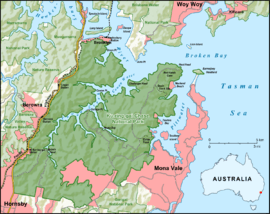Cowan, New South Wales
Cowan is a small town and suburb near Sydney, in the state of New South Wales, Australia, approximately 40 kilometres (25 mi) north of the Sydney central business district, in the local government area of Hornsby Shire. Cowan shares the postcode of 2081 with Berowra. Brooklyn, which lies 6 kilometres (3.7 mi) to the north-east of Cowan, is considered the northernmost suburb of the Greater Sydney Metropolitan Area.
| Cowan New South Wales | |||||||||||||||
|---|---|---|---|---|---|---|---|---|---|---|---|---|---|---|---|
 Pacific Highway passing through Cowan | |||||||||||||||
| Coordinates | 33°35′27″S 151°10′10″E[1] | ||||||||||||||
| Population | 649 (2016 census)[2] | ||||||||||||||
| • Density | 74.6/km2 (193.2/sq mi) | ||||||||||||||
| Postcode(s) | 2081 | ||||||||||||||
| Area | 8.7 km2 (3.4 sq mi) | ||||||||||||||
| Location | 38 km (24 mi) north of Sydney CBD | ||||||||||||||
| LGA(s) | Hornsby Shire | ||||||||||||||
| State electorate(s) | Hornsby | ||||||||||||||
| Federal Division(s) | Berowra | ||||||||||||||
| |||||||||||||||
History
The town takes its name from an Aboriginal word meaning big water.[3]
The 1828 census lists two convicts called Cowan, and it is also thought possible that Cowan was named after one of them. Still another suggestion is that it was named after a small town in Scotland.[4]
Besides the English botanist George Caley, who explored the area in 1805, the first Europeans to visit the area were timber-getters. The timber from Cowan was used for coach building, one of the first industries in the area.[4]
The railway stop at Cowan was originally a crossing loop to allow trains on the single-line north track to pass each other, and it was also the point at which auxiliary steam engines, connected to the trains at Hawkesbury River station (Brooklyn), were disconnected after the steep haul to the top of the plateau. A station and platform were constructed in 1901. With the coming of the railway, Cowan become a popular holiday spot and a regular starting point for bushwalkers.[4]
Cowan Public School opened in 1939.
In 1958, the rail line was electrified, and this also increased the number of people visiting the area, with families moving into the suburb, particularly those wanting to raise children in a bushland setting but near the city.[4]
There has been little change in Cowan village since it was first laid out as a crown subdivision in 1910. Lots ranged from 1,500 to 4,500 square metres.[4]
The predominance of freestanding three-bedroom houses set in gardens provides a sense of openness, and creates a pleasant transition to the bushland which surrounds the town.[4]
Population
In the 2016 Census, there were 649 people in Cowan. 86.2% of people were born in Australia and 91.0% of people spoke only English at home. The most common responses for religion were No Religion 37.5% and Anglican 20.1%.[2]
Transport
Access by road to Cowan is via the Pacific Highway which traverses Cowan north to south. The M1 Sydney to Newcastle Freeway runs past Cowan.
The Main Northern railway line runs parallel to the Pacific Highway through most of Cowan, descending north of the town via Cowan Bank. Cowan railway station is served by NSW TrainLink Central Coast & Newcastle Line services to Newcastle and Sydney Central.
Electric overhead railway power facilities are located in the north of Cowan. Cowan Bank was the location of the 1990 Cowan railway accident, in which there were five deaths.
Commercial area
There is a single General Store that serves the Cowan community, which is located on the corner of the Pacific Highway and Fraser Road.
A notable landmark of the Cowan area is the "Pie In The Sky" pie shop located approximately one kilometre north of Cowan on the Pacific Highway.[5] Pie In The Sky was featured in the Australian film Lantana, and is a frequent stop for day-trippers, bicycle riders and motorcycle/motor-scooter enthusiasts on weekends.
Facilities
Cowan Community Hall is a service provided by Hornsby Shire Council. Cowan Park and a small picnic area are adjacent to the Fire Station on View Street. Cowan is served by one public primary school, Cowan Public School.
Fire protection for the entire area of Cowan is provided by the NSW Rural Fire Service, through Cowan Rural Fire Brigade, however, a Mutual Aid Agreement with Fire and Rescue NSW ensures that Fire and Rescue NSW will also respond to any urban fire incidents within Cowan.
Cowan Post Office opened on 14 December 1936 and closed in 1993, however, postal services are still available in the local General Store.[6]
Jerusalem Bay
On 31 December 2017 a de Havilland Canada DHC-2 Beaver sea plane crashed on Jerusalem Bay (Cowan Creek) East of Cowan. The pilot and five British passengers perished in the crash.[7][8]
Notable residents
- Frank Duarte – physicist and author (former resident).[9]
References
- "Cowan". Geographical Names Register (GNR) of NSW. Geographical Names Board of New South Wales.

- Australian Bureau of Statistics (27 June 2017). "Cowan (State Suburb)". 2016 Census QuickStats. Retrieved 12 April 2018.

- "PLACE NAMES". The Australian Women's Weekly. National Library of Australia. 13 May 1964. p. 61. Retrieved 22 February 2011.
- Rowland, Joan (2008). "Cowan". Dictionary of Sydney. City of Sydney. Retrieved 20 April 2019.

- Not Quite Nigella
- Premier Postal History. "Post Office List". Retrieved 1 June 2012.
- Sea plane crashes on Hawkesbury River with six people on board Daily Telegraph 31 December 2017
- Crashed seaplane wreckage recovered in three parts from Jerusalem Bay The Australian 4 January 2018
- F. J. Duarte, Laser Physicist (Optics Journal, New York, 2012).